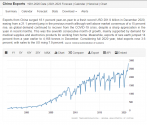This is why decoupling is so difficult. And forming an anti-China alliance is nearly impossible. Both the US and its allies and the world rely upon China in one way or another.
Short of a blockade, decoupling is dependent on China. Hence China doing BRI.
Only it China decides to close up can it decouple.
i.e. Walmart/Amazon has plenty of customers even if half the people decide to boycott.
Only ones that lose are those that miss out on the cheaper goods.
I thought Japan had a counter to China's Belt and Road...? The number one thing they would need to counter is more money than China would offer. They already failed on the first step.
What happened to all those countries buying up Australian wine so China's ban was futile?
@KYli Japan should understand that the American hates them more than China. They had a rallying slogan against her the PEARL HARBOR ATTACK, that mistrust is there and will be always be remembered ,that's why the leashed will never be removed.
Global Times view in decoupling. It will be harder than the G7 thinks in the upcoming G7 summits. There is just no way in the world that Germany and Japan.and to a lesser extent the Italians and French is going to walk walk away from China. I can see the Anglos like UK and Canadians going with U.S. reluctantly. But if that's all the got. Then it's a win for China.
From GT:
Germany, Japan among G7 nations less likely to be roped into US’ anti-China alliance
By Li Xuanmin
Published: Feb 19, 2021 02:00 PM
Talking about driving the global economic recovery at the upcoming G7 Summit without China, or even stressing the "China challenge" at the meeting, will be like "navigating in the sea without a compass," giving the bloc's diminishing contribution to the world economy and China's increasing role as a global engine in the post-virus era, analysts said.
Among the G7 countries, European and Asian economies such as Germany and Japan are less likely to be roped into joining the US-led "counter China" alliance, analysts noted.
Such nations, taking into account the level of dependence their economies and industries have on the world's second-largest economy, will trade off between their economic interests and how they maintain relations with their traditional ally, the US, whose reputation sank during Trump's four years of mayhem.
The G7 virtual meeting is set to take place on Friday. According to the White House, US President Joe Biden, along with leaders from other G7 nations, will discuss the coronavirus pandemic, the world economy and "dealing with China" during the meeting.
"Biden will also discuss the need to make investments to strengthen our [the US'] collective competitiveness and the importance of updating global rules to tackle economic challenges such as those posed by China," said the White House.
Analysts said Biden's speech at the summit will aim to deliver a clear signal that the economies of the G7 industrial nations will develop in a robust manner and reclaim their leading roles in driving the world's growth.
Also, Washington will attempt to form alliances with the other developed G7 economies to limit or even cut off China's role in the post-virus economic recovery, and suppress China's development in strategically important fields such as 5G and digital industries.
"This is not realistic. G7 nations, despite having an edge in technology and the international division of labor, only make up a part of the global economy, and their shares in the global economy are already shrinking," Cui Hongjian, director of the Department of European Studies from the China Institute of International Studies, told the Global Times on Friday.
According to media reports, the bloc's share now only represents 33 percent of the global GDP, while three decades ago, the share was closer to 70 percent. Meanwhile, China — as the only major economy to expand last year — is expected to produce 18.6 percent of the world's total GDP in 2020, according to estimates by Statista.
Some analysts described US and other G7 nations as "strange bedfellows," since their perceptions on China, in particular from an economic perspective, are likely to be drastically different, which could ruin the US' hope of forming an alliance to curb China's rise.
"Germany might be the first among the G7 economies to not echo the US' call… China is Germany's largest auto market; how could the nation abandon China's sheer market size just for empty promises that the US may walk away from at any time?" a Beijing-based industry observer, who preferred not to be identified, told the Global Times on Friday.
China has been the largest trading partner of Germany — a major economy in the EU bloc — for four consecutive years. China and the EU also completed negotiations on an epic bilateral investment treaty last year.
Japan, which has seen booming trade flows with its neighboring China, may also not wholly agree with the US, the observer predicted. In November, China, Japan and other 13 Asia-Pacific nations signed the world's largest trade agreement — RCEP. It became Japan's first trade deal with China, its largest trading partner.
In addition to the US, Germany and Japan, the G7 also includes France, Italy, the UK and Canada. Friday's virtual meeting will be hosted by British Prime Minister Boris Johnson.

